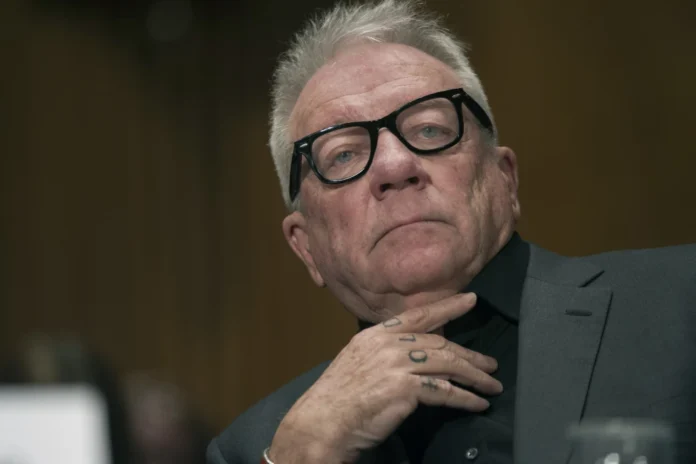Michael Lacey, the founder of the lucrative classified site Backpage.com, was sentenced to five years in prison and fined $3 million on Wednesday for a single money laundering count in a complex case involving allegations of a years-long scheme to promote and profit from prostitution through classified ads.
Last year, a jury convicted Lacey, 76, on one count of international concealment money laundering, but deadlocked on 84 other counts of prostitution facilitation and money laundering.
Lacey was eventually cleared of hundreds of counts due to inadequate evidence, but he remains charged with prostitution facilitation and money laundering.
Authorities claim the site produced $500 million in prostitution-related earnings between its establishment in 2004 and its closure by the government in 2018.
Lacey’s attorneys claim their client was focused on creating an alternative newspaper network and was not engaged in the day-to-day operations of Backpage.
However, at Wednesday’s sentence, Humetewa informed Lacey that he was aware of the claims against Backpage but did nothing.
“In the face of all this, you stood firm,” Humetewa stated. “You didn’t do a thing.”
Two additional Backpage executives, Chief Financial Officer John Brunst and Executive Vice President Scott Spear, were convicted last year and sentenced to ten years apiece on Wednesday.
The court ordered Lacey and the two executives to surrender to the United States Marshals Service in two weeks to begin serving their terms.
“Backpage.com founder Michael Lacey sentenced to 5 years in prison, fined $3M for money laundering”
Prosecutors said the three defendants were driven by greed, promoted prostitution while posing as a genuine classified company, and deceived anti-trafficking groups and law enforcement officials about Backpage’s actual business plan.
Yvonne Ambrose, whose 16-year-old daughter Desiree Robinson was trafficked in Chicago on Backpage and slain in 2016 by a guy who answered an online sex ad, spoke to the court on Tuesday about her grief over her daughter’s death.
“I suffer every day from the loss of my baby,” Ambrose added.
Prosecutors claim Lacey utilized cryptocurrencies and moved money to foreign bank accounts to launder proceeds from the site’s ad sales after banks voiced concerns about their use for criminal purposes.
According to authorities, Backpage staffers would do Google searches to find prostitutes before calling and offering them a free ad. The site is also suspected of having a commercial agreement in which it places advertisements on another website where clients may publish evaluations of their encounters with prostitutes.
The site’s marketing director has previously pleaded guilty to conspiracy to aid prostitution and admitted to taking part in a plan to provide prostitutes with free advertisements in order to earn their business.
Additionally, Carl Ferrer, the CEO of the firm, pled guilty to a separate federal conspiracy case in Arizona and state money laundering counts in California when the authorities shut down the site.
A jury acquitted two other Backpage workers of accusations during the same 2023 trial in which Lacey, Brunst, and Spear were found guilty on certain counts.
At trial, the Backpage defendants were barred from bringing up a 2013 memo from federal prosecutors who examined the site and stated that they had found no evidence of a pattern of recklessness toward minors or admissions from key participants that the site was being used for prostitution.
According to the letter, witnesses claimed that Backpage made significant efforts to prevent illegal activity on its website and coordinated these efforts with law enforcement organizations. The document was created five years before Lacey, Larkin, and the other former Backpage executives were indicted in the Arizona case.
According to a Government Accountability Office report published in June, the FBI’s ability to identify victims and sex traffickers decreased significantly after Backpage was seized by the government because law enforcement was familiar with the site and Backpage was generally responsive to information requests.
Prosecutors stated the site’s moderation attempts were intended to disguise the genuine nature of the adverts. Though Lacey and Larkin sold their shares in Backpage in 2015, prosecutors argued the two founders still had influence over the site.
